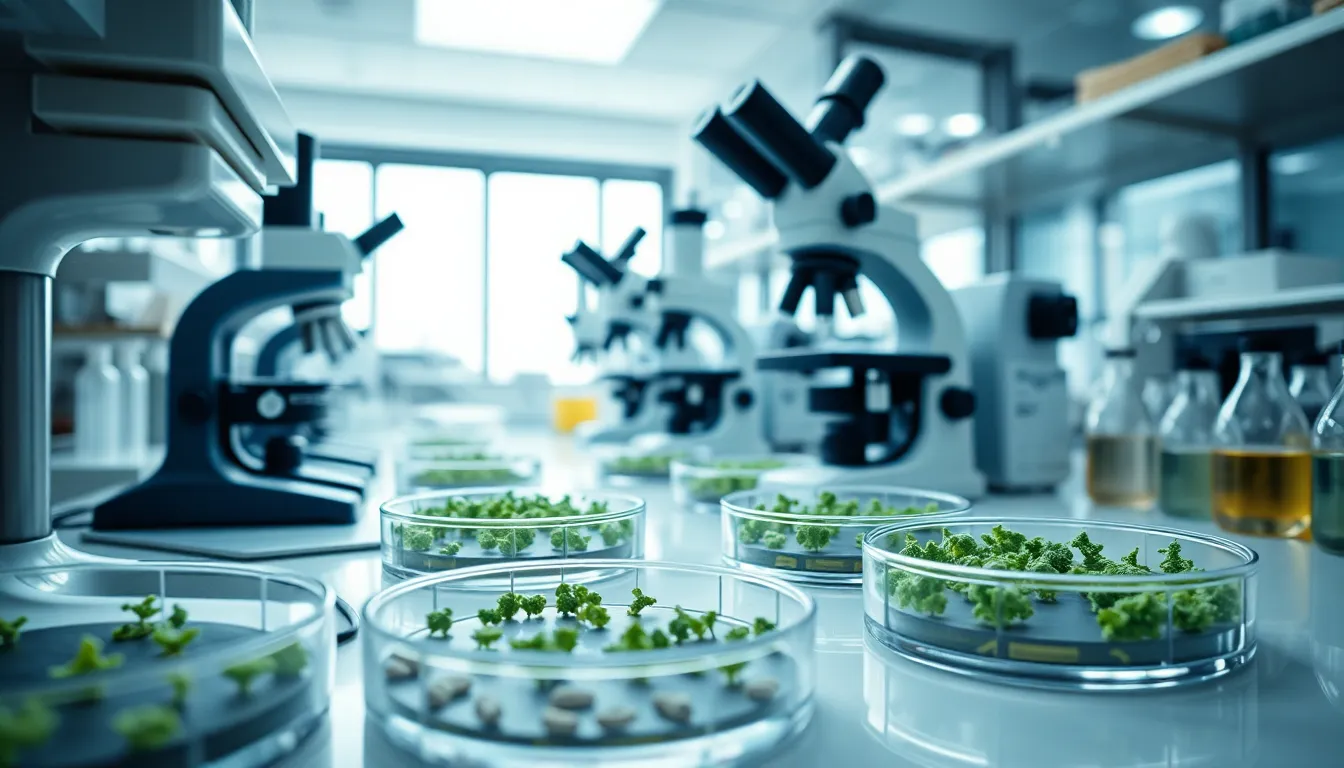Table of Contents
ToggleStem cell biotechnology stands at the forefront of modern medicine, promising revolutionary advancements in treating various diseases and injuries. These remarkable cells possess the unique ability to develop into different cell types, making them a powerful tool in regenerative medicine. As researchers explore their potential, the applications of stem cell technology continue to expand, offering hope for conditions once deemed untreatable.
With ongoing innovations and breakthroughs, stem cell biotech is reshaping the landscape of healthcare. From developing personalized therapies to understanding complex biological processes, this field is not just a scientific endeavor; it’s a beacon of hope for millions. As the conversation around stem cell research evolves, it’s crucial to understand its implications and the ethical considerations that accompany these advancements.
Overview of Stem Cell Biotech
Stem cell biotechnology represents a frontier in medical science, delivering innovative solutions for treating a range of diseases and injuries. Stem cells possess the exceptional capability to differentiate into various cell types, which underscores their significance in regenerative medicine. Applications for these cells span across numerous disciplines, including oncology, neurology, and cardiovascular medicine.
Types of Stem Cells
- Embryonic Stem Cells: Derived from early-stage embryos, these cells exhibit pluripotency, enabling them to transform into any cell type, fostering extensive research possibilities.
- Adult Stem Cells: Found in various tissues, such as bone marrow and fat, these multipotent cells can only differentiate into a limited range of cell types, contributing to tissue repair and regeneration.
- Induced Pluripotent Stem Cells: Adult cells reprogrammed to an embryonic-like state demonstrate pluripotency, providing a valuable resource for personalized medicine and disease modeling.
Applications in Medicine
Stem cell biotech drives advancements in several areas:
- Regenerative Medicine: Restoration of damaged tissues and organs using stem cell therapies presents groundbreaking prospects for patients with chronic conditions.
- Disease Modeling: Creation of in vitro models using stem cells facilitates study of disease mechanisms, enhancing understanding and enabling drug discovery.
- Cell-Based Therapies: Transplantation of stem cells can treat conditions like type 1 diabetes and spinal cord injuries, offering potential cures or significant improvements in quality of life.
Ethical Considerations
Engagement in stem cell research generates ongoing discussions about ethical implications. Ensuring responsible practices, researchers evaluate the moral dimensions of sourcing embryonic stem cells while balancing scientific progression and societal views. Adhering to established guidelines ensures that advancements proceed with respect for human rights and dignity.
Innovations in stem cell biotechnology can transform healthcare systems, making therapies more effective and tailored to individual needs. As research continues, the integration of these technologies holds promise for future medical breakthroughs.
Types of Stem Cells

Stem cells fall into three primary categories, each possessing unique properties and applications in biotechnology. Understanding these types of stem cells is crucial for advancements in regenerative medicine and therapeutic interventions.
Embryonic Stem Cells
Embryonic stem cells (ESCs) originate from early-stage embryos. These cells are pluripotent, meaning they can differentiate into any cell type found in the human body. ESCs hold immense potential for regenerative therapies due to their capability to generate heart, nerve, and muscle cells, among others. Research indicates that ESCs could play a vital role in treating conditions such as spinal cord injuries and degenerative diseases. However, ethical considerations regarding the sourcing of these cells remain a significant barrier in research.
Adult Stem Cells
Adult stem cells, or somatic stem cells, reside in various tissues and are multipotent, which limits their differentiation capabilities compared to ESCs. These cells typically differentiate into cell types related to their tissue of origin, such as hematopoietic stem cells in bone marrow producing blood cells. Adult stem cells contribute to tissue maintenance and repair, making them integral to regenerative medicine. Applications include the treatment of blood disorders like leukemia and organ repair following injury.
Induced Pluripotent Stem Cells
Induced pluripotent stem cells (iPSCs) are adult cells reprogrammed to an embryonic-like state, achieving pluripotency. This innovation allows researchers to generate iPSCs from patient-specific cells, reducing the ethical concerns associated with ESCs. iPSCs possess the ability to develop into various cell types, paving the way for personalized medicine and disease modeling. These cells are instrumental in studying diseases and testing potential treatments, offering significant promise in advancing therapeutic approaches across diverse medical fields.
Applications of Stem Cell Biotech
Stem cell biotechnology presents various applications that significantly impact healthcare. This section explores three key areas: regenerative medicine, drug development, and disease modeling.
Regenerative Medicine
Regenerative medicine utilizes stem cells to repair or replace damaged tissues and organs. Stem cells’ unique ability to differentiate into various cell types makes them indispensable for treating conditions such as spinal cord injuries, heart disease, and diabetes. For example, scientists use embryonic stem cells for creating cardiomyocytes, which can revitalize damaged heart tissues. Adult stem cells support tissue maintenance and repair, particularly in hematopoietic stem cell transplants for blood disorders. Induced pluripotent stem cells enable personalized therapies by modeling patient-specific conditions, paving the way for tailored treatment strategies.
Drug Development
Stem cell technology accelerates drug development processes, offering advantages in drug testing and efficacy evaluation. By using stem cells to generate relevant cell types, researchers can screen for drug responses in vitro, leading to more accurate predictions of clinical outcomes. For instance, patient-derived iPSCs can simulate individual responses to treatments, aiding in the identification of effective pharmaceuticals. Moreover, stem cell-based models help refine pharmacokinetic profiles, significantly reducing the need for animal testing and supporting ethical research practices.
Disease Modeling
Disease modeling through stem cells facilitates the study of various health conditions at a cellular level. Researchers create disease-specific iPSCs from patients, allowing for the exploration of genetic and environmental influences on disease progression. For instance, iPSCs can model neurological disorders like Alzheimer’s disease, enabling the examination of pathological mechanisms and potential therapeutic targets. Such models enhance understanding of complex diseases and support the development of customized treatment approaches.
Ethical Considerations in Stem Cell Research
Ethical considerations in stem cell research play a critical role in guiding practices and policies within the field. Many viewpoints arise from the sourcing and use of embryonic stem cells, which are derived from human embryos. Due to this intricate sourcing process, ethical debates often center around the moral status of embryos and the rights of potential life.
Regulatory frameworks vary significantly across different countries, influencing research directions. In some nations, policies restrict embryonic stem cell research, while others permit it under strict conditions. Addressing these differences is essential for promoting responsible scientific advancement.
Adult stem cells and induced pluripotent stem cells generally raise fewer ethical concerns. Adult stem cells, sourced from tissues such as bone marrow, present minimal moral issues, as their retrieval does not involve the destruction of embryos. Induced pluripotent stem cells, derived from reprogrammed adult cells, avoid ethical conflicts associated with embryonic sources, offering a pathway for innovative therapies without contentious implications.
Informed consent remains a significant ethical consideration. Researchers must acquire explicit permission from donors when using their cells, ensuring transparency and respect for individual autonomy. Upholding informed consent fosters trust between the scientific community and society, reinforcing ethical research practices.
Ongoing public discourse on ethical implications contributes to shaping policies that reflect societal values. Engaging the public in discussions about stem cell research encourages transparency and creates a shared understanding of the potential benefits and risks. This dialogue supports the development of ethical guidelines that prioritize both scientific advancement and human dignity.
Future Trends in Stem Cell Biotech
Emerging trends in stem cell biotechnology point toward significant advancements in regenerative medicine, disease treatment, and personalized therapies. Innovative techniques, such as CRISPR gene editing, enhance the ability to modify stem cells, paving the way for precise therapies targeting genetic disorders. As researchers refine these technologies, they unlock new opportunities for curing diseases previously deemed untreatable.
Collaboration between biotech companies and academic institutions accelerates the development of stem cell therapies. Multidisciplinary teams foster innovation in research, combining expertise in genetics, cellular biology, and engineering. These partnerships enable faster transition from laboratory discoveries to clinical applications.
The growing emphasis on personalized medicine transforms clinical practices. Patient-specific stem cells derived from iPSCs allow for tailored treatments, minimizing adverse reactions. Such advancements lead to improved patient outcomes as treatments evolve to meet individual needs.
Regulatory frameworks continue to adapt, promoting responsible research while ensuring safety and efficacy. Stricter guidelines help safeguard ethical considerations in research, particularly concerning embryonic stem cells. These frameworks support transparency in clinical trials, building public trust as stem cell therapies progress.
The integration of artificial intelligence (AI) enhances drug discovery and disease modeling. AI-driven algorithms analyze large datasets, identifying potential treatment pathways. Machine learning aids in predicting treatment responses, facilitating the design of more effective stem cell-based therapies.
Global collaboration further shapes the future of stem cell biotech. International partnerships allow for shared knowledge and resources, accelerating research breakthroughs. Collaborations promote a cohesive effort to address global health challenges, fostering a comprehensive understanding of stem cell applications across different contexts.
As the field continues to evolve, advances in biotechnology, ethical standards, and global collaboration will drive the future of stem cell research. These trends define the trajectory of medical innovation, promising a new era of advanced therapies and improved healthcare outcomes.
Stem cell biotechnology stands at the forefront of medical innovation. Its ability to transform treatment options for various diseases and injuries is unmatched. As advancements continue to unfold, the potential for personalized therapies grows, promising to enhance patient outcomes significantly.
Ethical considerations remain pivotal in guiding research practices. Balancing scientific progress with respect for human rights ensures a responsible approach to stem cell applications. Ongoing discussions around these issues will shape the future landscape of this dynamic field.
With the integration of cutting-edge technologies and collaborative efforts, stem cell biotech is poised to redefine healthcare. The journey ahead holds immense promise for breakthroughs that could change lives and improve health on a global scale.




